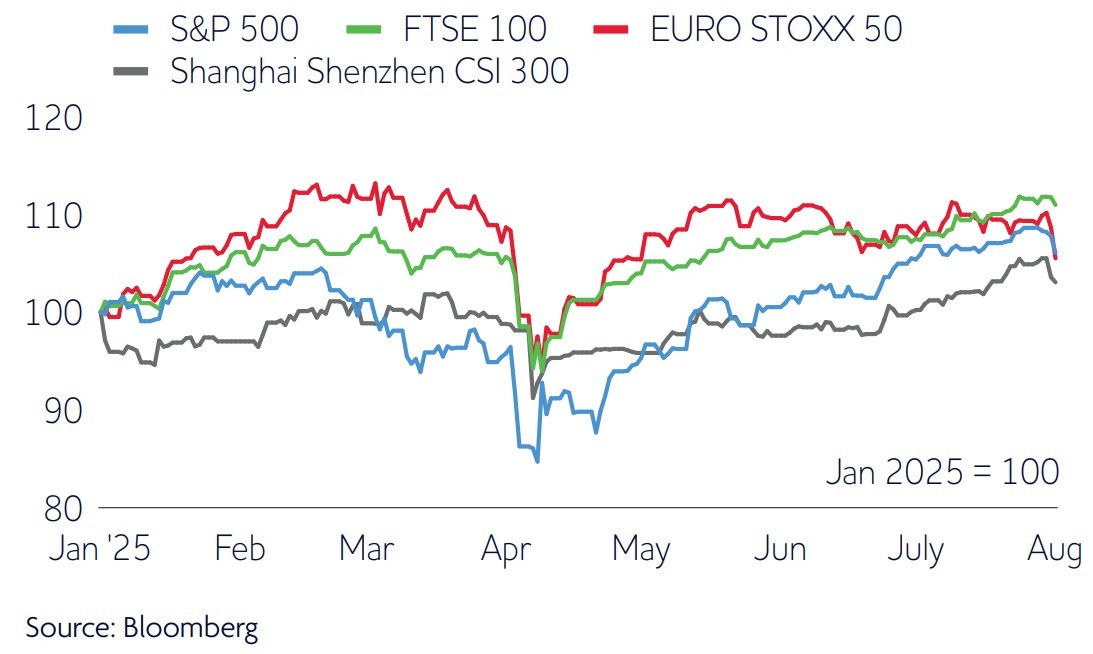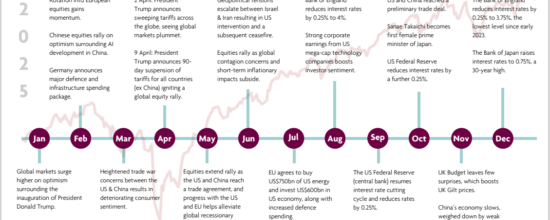Market Update - August 2025
Stocks push higher on trade deal optimism
Global equities climbed in July as renewed hopes for trade agreements buoyed investor sentiment
All-time highs
Global stocks enjoyed another strong month,
with several indexes hitting record levels. US markets surged, driven by
the tech sector and optimism over trade negotiations. Sentiment was
further lifted after the US and EU struck a trade agreement. UK shares
initially faltered amid speculation that Chancellor Rachel Reeves might
resign but soon recovered. The FTSE 100 later climbed to a new high as
investors brushed off trade war concerns.
The US announced further trade agreements with South Korea and
Japan, adding to recent deals with Britain, Vietnam and Indonesia, and
maintaining a tariff truce with China.
Despite pressure from President Donald Trump, the US Federal
Reserve held its benchmark rate steady. Markets are currently pricing
in one cut later this year, likely in September. Meanwhile, US inflation
rose to 2.7% in June from 2.4% in May, as the impact of tariffs began to
feed through to consumers.
The US economy and labour market remained resilient. The economy added 147,000 jobs in June, defying fears that tariffs would dampen hiring. The unemployment rate declined to 4.1%, down from 4.2% in May. The dollar, which had its worst start to a year since 1973, has also steadied on the back of stronger data.
UK inflation rises
UK inflation rose unexpectedly to an
18-month high of 3.6% in June, up from 3.4% in May – a setback for
the Bank of England, which is still expected to cut rates in August and
again later this year.
GDP fell by 0.1% in May after a 0.3% contraction in April, raising fears
the economy could be slowing more than anticipated following a
strong start to the year.
Unemployment climbed to 4.7%, the highest in four years, while wage
growth eased from 5.3% to 5%. Reeves is expected to raise taxes in the
autumn Budget, though a weaker outlook and rising joblessness could
make this politically difficult.
EU and US trade deal
After months of negotiation, the EU
and US agreed on a trade deal, with 15% tariffs on European exports
to America – half the 30% import tax Trump had threatened. The
European Central Bank (ECB) kept interest rates on hold at 2% amid
ongoing uncertainty. It has already cut rates four times this year.
Eurozone inflation rose in June, returning to the ECB’s 2% target.
The rate was up from 1.9% in May, the first increase since January,
reinforcing the ECB’s cautious stance.
Meanwhile, China’s economy shrugged off the impact of Trump’s trade
wars in the second quarter, growing by 5.2%. The world’s secondlargest
economy has so far avoided a downturn, helped by Beijing’s
stimulus measures and a trade truce with the US. Exports rose 5.8% in
June as firms took advantage of the truce to ship goods ahead of the
August deadline for a more definitive deal.
However, the Chinese economy continues to face challenges. Inflation
turned positive for the first time since January, but deflationary
pressures continue to cast a shadow. Despite efforts to stimulate the
economy, weak domestic demand is still dragging on growth.
Figure 1: Stock market performance Despite the dip following the announcement of Trump’s tariffs in April, equity markets have delivered positive returns so far this year.



